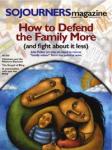As of this writing, we're fresh off the midterm elections and glad to see the end of divisive campaigning for a while (though we're not naive enough to think the shouting is all over). As with most elections, the political buzzwords lobbed with abandon into our living rooms and public spaces often carried all the subtlety of heat-seeking missiles.
"Pro-family" has to be one of the most used and abused phrases. We spend a lot of time fighting over who constitutes a family -as associate editor Julie Polter writes in this issue, even Tony Soprano could be considered pro-family by some definitions- yet, what does it really mean? And what would truly pro-family policies look like? As she argues, once we pick our way through the political landmines these slogans contain, there are concrete policies and practices that we as individuals and as the church can work toward that are in line with Jesus' commands to care for each other.
That impulse is the driving force behind a movement of young people, dubbed the "New Monastics," who are saying no to the violence, materialism, and individuality of mainstream culture. About 500 of them gathered in June at an East Tennessee farm to worship, exchange ideas, and play. Shane Claiborne, part of Sojourners/Call to Renewal?s Red Letter Christians, was the main instigator behind the "People Against Poverty and Apathy" festival, reports former Sojourners intern Josh Andersen. Their aim isn't just to get people talking and acting differently, but to actually transform their communities according to gospel values. Now that is something to celebrate. -The Editors

Got something to say about what you're reading? We value your feedback!